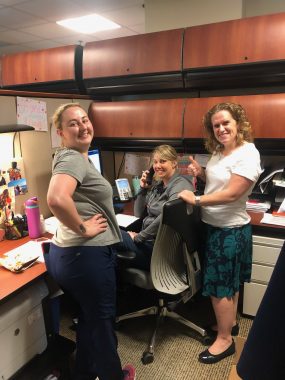Not All Heroes Wear Capes

You see them before and after you see a doctor. They are often the first person you see upon waking from anesthesia. They hold your hand during the difficult part of a procedure. They see you at your weakest state and help return you to health. Sadly, in some cases, they will be the last person to hold your hand. They are the angels who walk among us.
Idiopathic pulmonary fibrosis (IPF) patients, along with all other rare disease patients, often develop a bond with our nurses — our healthcare heroes.
Support at every step
During each leg of my IPF journey, my wife, Susan, and I have been fortunate to have some of the most amazing nurses walk with us, including five at the lung transplant center at Inova Fairfax Hospital in Falls Church, Virginia. Since my diagnosis in early 2017, two of those nurses have moved on to other roles. (Not because of me, I promise.) The other three continue to guide us on our journey.
In a recent column for National Donate Life Month, I recounted the call I received on the morning of July 9, 2021. Those three nurses — Michelle Schreffler, Patricia Jackson, and Melissa Bowen — had a lung offer for me. In the days that followed, I saw them in the hospital during my bilateral lung transplant and recovery. Today, I still see them during clinic visits.

From left, Patricia Jackson, Michelle Schreffler, and Melissa Bowen, three of my nurses, call me with a lung offer on July 9, 2021. (Courtesy of Michelle Schreffler)
Post-transplant care
I remained in the hospital for 10 days after my transplant. Nurses from the Cardiovascular ICU and the Cardiovascular Step Down Unit provided me with around-the-clock care.
At the time, visiting hours and the number of visitors allowed were reduced due to COVID-19. More than two dozen nurses from those two units took care of me. I’m not necessarily a modest person, but there were embarrassing moments during my recovery. They dealt with every situation, complication, and event with poise.
The nurses answered every question we had. They taught us (primarily Susan) how to take care of me following discharge, covering everything from hygiene to changing the dressings on my incisions. They educated not only Susan but two backup caregivers prior to my discharge.
To nurse
Whether it’s used as a noun or a verb, the word “nurse” is representative of care. I could not agree more based on my experiences.
Over the past few years, these nurses have also been at the front line in dealing with COVID-19 cases. As I write this column, “NBC Nightly News” is reporting the United States has now exceeded 1 million deaths from COVID-19. Receiving the gift of life in the midst of a pandemic did not diminish the care I received.
Thank you
This week is National Nurses Week — yet a week hardly seems enough, given all that nurses do. Encountering any of my nurses makes my smile broader. Even wearing a mask, I feel it shows. Greetings are still exchanged via fist bumps and elbow knocks. Hugs seem like a distant memory. The photo above is the only time I’ve seen those three nurses without a mask in more than two years. I have missed those smiles.
Saying thank you is not enough. The nurses who have accompanied us on our journey have been angels. They are proof that not all heroes wear capes. Some heroes wear scrubs and have helped me make every breath count.
Do you have a great nurse who has helped you on your journey? I would love to hear your story in the comments below.
Note: Pulmonary Fibrosis News is strictly a news and information website about the disease. It does not provide medical advice, diagnosis, or treatment. This content is not intended to be a substitute for professional medical advice, diagnosis, or treatment. Always seek the advice of your physician or other qualified health provider with any questions you may have regarding a medical condition. Never disregard professional medical advice or delay in seeking it because of something you have read on this website. The opinions expressed in this column are not those of Pulmonary Fibrosis News or its parent company, Bionews, and are intended to spark discussion about issues pertaining to pulmonary fibrosis.









Leave a comment
Fill in the required fields to post. Your email address will not be published.